Customer service motivation is easy to get wrong but if you get it right, it will transform life in your customer service teams.
Think about it, customer service isn’t just about doing the job — it’s about doing it with a smile. It’s about the employees who are willing to go the extra mile for their clients. Even if it means working harder than they initially expected. Great customer service isn’t just about efficiency—it’s also, to a great extent, about attitude.
That’s why you can never overstate the importance of motivation in customer service.
But what is motivation when it comes to customer service representatives? What compels them to want to help customers when we know they are not always so nice back?
Let’s have a look.
Why is motivation important in customer service?

In order to answer this question, let’s first take a look at what motivates a customer service agent.
According to psychologists, people can experience motivation in two ways: intrinsically and extrinsically.
Simply Psychology says that when you are intrinsically motivated, the reward is the sheer challenge and enjoyment of the task at hand and the satisfaction that comes from doing it well.
Intrinsic motivation is triggered by activities of pleasure or purpose, taking on challenges, following curiosity, or gaining control in a situation.
Extrinsic motivation, on the other hand, drives people to take action to achieve an outcome that can only come from an outside source.
When people are extrinsically motivated, they are driven to act by the promise of reward, praise, or power, the thrill of competition, or the fear of punishment.
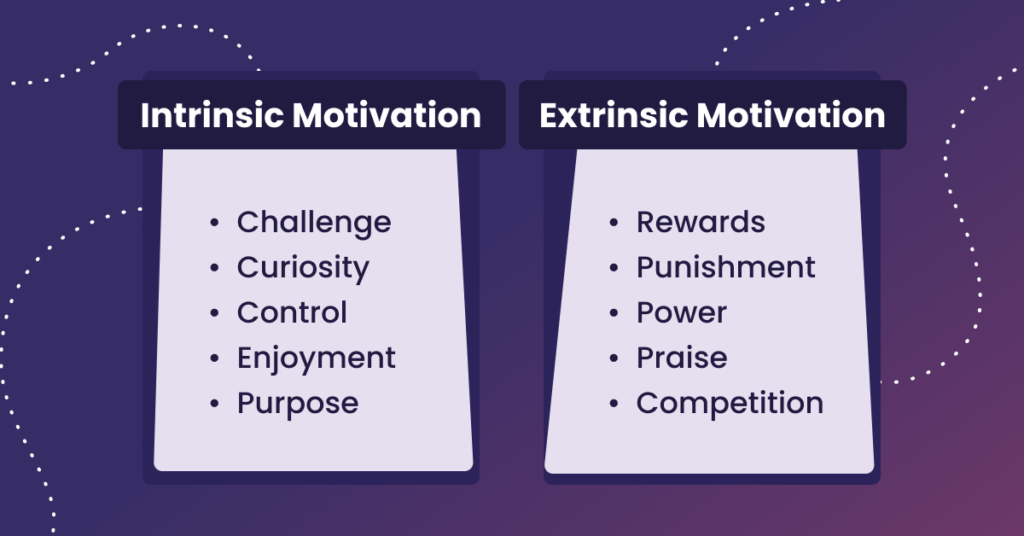
In customer service, intrinsic motivation is very important because it allows employees to give customers the best possible experience without having dependence on external factors.
A study conducted by researchers at Yale University found that a person’s motivation was directly related to their performance in customer service jobs.
Looking at data from more than 1,400 mid-level managers in hotel chains, the study showed that those who exhibited a high degree of intrinsic motivation (motivation from within) were better performers than those with low levels of intrinsic motivation — even after accounting for potential confounding factors like competence and experience.
The study also concluded that intrinsic motivation correlated with both job satisfaction and job performance, meaning that having high levels of intrinsic motivation also makes you happier at work.
What can you then do to motivate your customer service agents?

7 ways to motivate your customer service team
One of the biggest reasons people leave customer service jobs is that they don’t feel like they’re helping people. They feel like they’re just pushing buttons. And when people don’t appreciate all the work it takes to push those buttons, it’s demoralizing.
89% of executives at high revenue companies agree that when their agents are happy so are their customers. We need to understand the science of call center motivation because it has a direct influence on customer satisfaction.
There’s no denying it. Support teams are at the top of their game when they can lift each other up when morale is low. Whether you’re an agent, QA specialist, team lead, or Head of Customer Service – you got where you are today because you knew your strengths and sought out an opportunity that would let you shine. Now, we know the science, let’s go empower some agents!Here are 7 practical ways to motivate your customer service team!
1. Set clear goals
Every member of your customer service team should be clear on what their goals and responsibilities are, what they need to deliver in terms of performance, and how you expect them to go about their jobs.
A study published by Gallup suggests that the effectiveness of goal setting is heavily influenced by how clearly goals are communicated. Team Leads need to provide their agents with the information they need to do their job. Without this clarity, misguided agents who think they are improving become frustrated and demotivated by the lack of direction from their superiors.
They should also be able to see a direct connection between their day-to-day tasks and the broader business objectives of your organization. The clearer those goals are, the more likely it is that everyone will feel like they’re working toward something meaningful. Which will ultimately translate into higher motivation levels.
With Kaizo’s Missions, you can give your agents individual time-bound goals that will be based on their prior performance and aimed at improving it. With quantified performance data at hand, you can motivate your team to excel and hit challenging targets.
Here’s an example of such a goal:
Get your average First Reply Time to 30 min by the end of the week
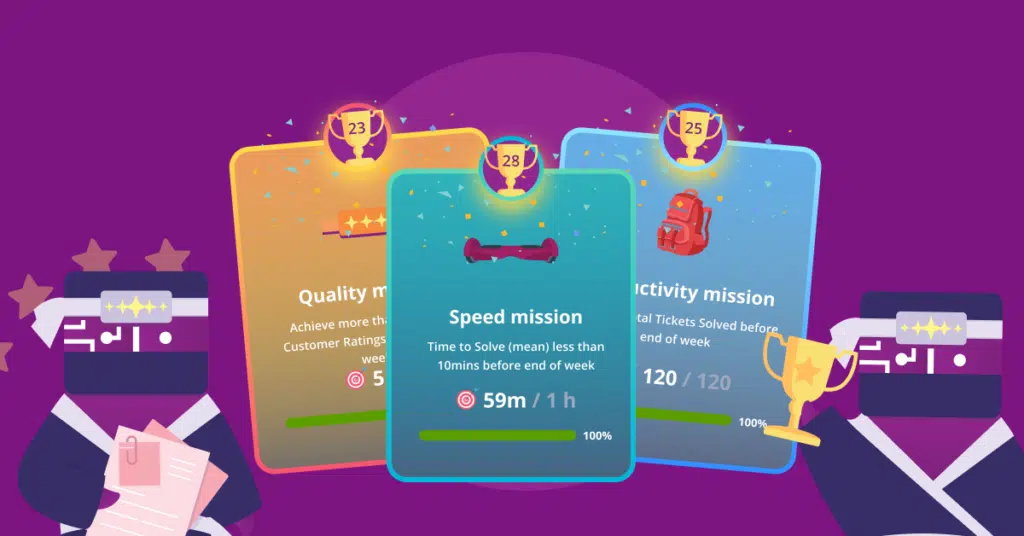
As you can see, Kaizo helps you manage agent performance and improves communication in teams. Kaizo Missions help you activate your intrinsic motivation to take on challenges. On top of that, completing missions week after week is rewarding and fun!
2. Give advice by creating Coaching Cards
One way to ensure that each person’s goals are clear is to have an ongoing discussion with them about their performance in relation to those goals.
The Kaizo Customer Service Agent Empowerment Report found that agents want frequent and meaningful 1:1 feedback sessions. While 45% of agents reported wanting monthly sessions. Another 38% said that they would prefer to receive feedback about their work every two weeks!
Your agents want to talk to you and we can help with that!
A great first step is to create Coaching Cards that outline what you think they need to improve on and how close they are to reaching their targets. This will start a dialogue with employees, who can then ask questions about the cards and get advice on how to improve.
For example, you can help your agents improve their Customer Satisfaction Rate (CSAT) by giving them customized guidance on what they can do to get there, setting tasks and deadlines to track progress.
Here’s what it could look like.
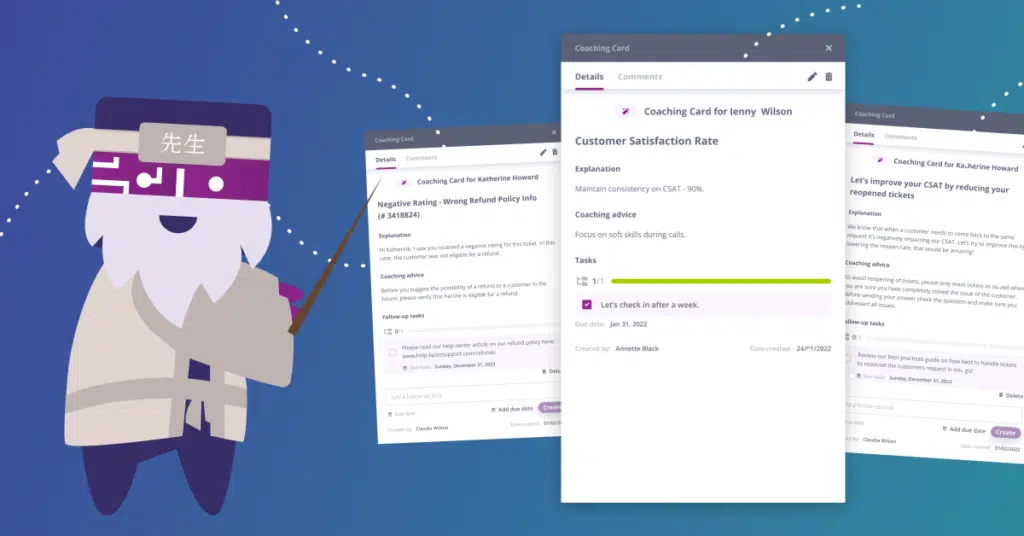
3. Give autonomy
If there is one sure way to motivate your customer service team it would be this — prove to your agents that you trust their judgment. And avoid unwarranted micromanaging — that’s the quickest way to kill your agent’s motivation. Above anything else, people want to feel trusted to do their job, and customer service agents make no exception. Micromanaging slashes at your agent’s confidence and sense of control and competency.
This autonomy means to give your team members the freedom to make decisions on their daily tasks based on their experience and expertise. When agents feel confident enough to work independently, they act with more authority and are more determined to overcome obstacles, simply because they chose to do so.
Issues arise when managers treat their customer service team like robots: all doing the same thing, all saying the same thing, and all trying to do it the same way. When they don’t get autonomy in how they speak to customers and what they say, they feel like they’re being forced to adhere to a script when all they really want is to have a real conversation with their customers.
This is what we learned about autonomy in our Empowerment Report:
- 8/10 customer service agents get a satisfactory amount of autonomy to make decisions in their role
- 73% of agents want more autonomy in their role
- 80% said if given more decision making freedom they would work beyond what’s expected of them
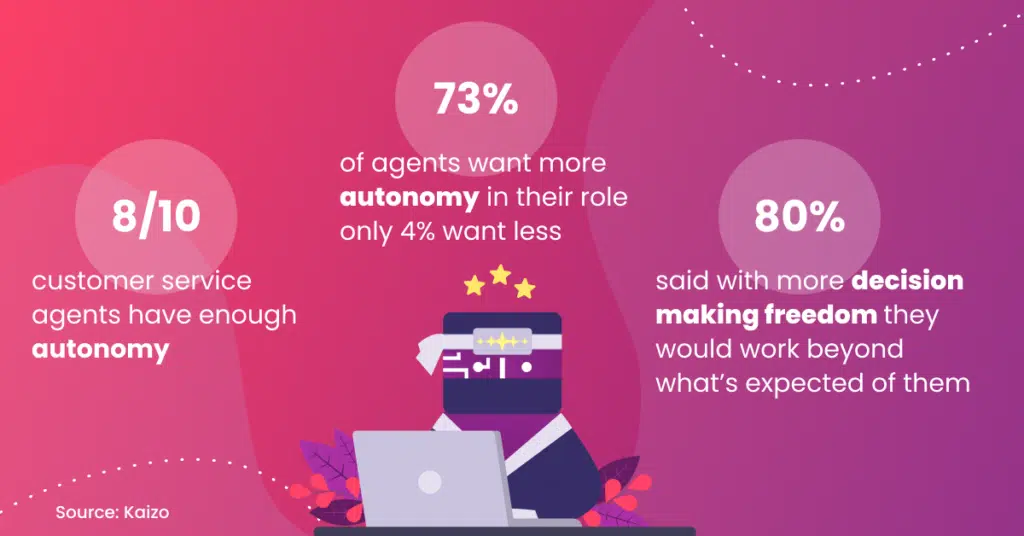
Of course, call centers need consistency to achieve KPIs. But when agents aren’t given autonomy to use their own judgment, motivation is extinguished like a candle in the wind.
Customers want real conversations with their support agents. So why not empower agents to be themselves, play to their strengths, and drive their own growth?
4. Lead by example
Motivation and leadership go hand in hand in customer service.
Agents will look to their team leads when it’s time to rally the troops when times get rough. And what’s more inspiring than seeing your managers get their hands dirty and take on support responsibilities as well?
In fact, even companies like Amazon, Zappos, Craigslist, and Rackspace know how important it is for agents to see their superiors actively leading by example, spending some time on the front lines, and showing your agents how it’s done! These industry giants practice “everyone does support”, which is a business model calling all employees, whatever their rank and status, to spend some time interacting with customers and solving support tickets.
This can be a compelling technique when it comes to handling dissatisfied customers. Leaders who approach negative feedback as a way to drive business know how to turn the tide and convince their agents to keep their heads up.
The relationship agents have with their team leads has a huge impact on customer service motivation. You want employees to feel like support their success and that they can come to you with any questions or concerns they might have about their job.
5. Reward and show appreciation
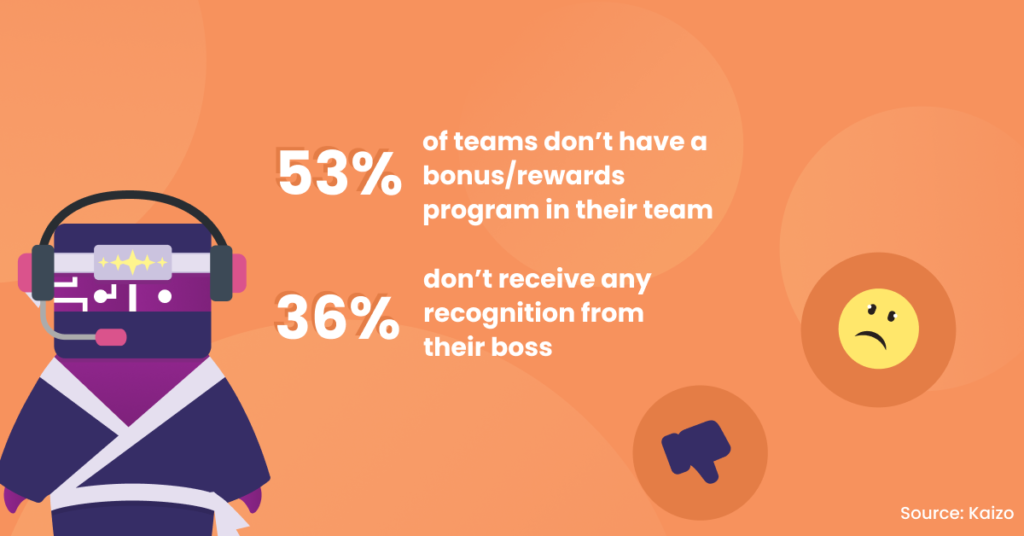
One of the best strategies when it comes to motivation in customer service is all about praising your agents. Unfortunately, our Agent Empowerment Survey revealed an unpleasant truth about the lack of rewards and recognition in call centers.
But we can turn this around! Positive reinforcement is one of the most simple and cost-effective ways to motivate your customer service team.
If an employee does something particularly well, make sure he or she knows it! This may seem simple and obvious, but many managers overlook this very basic tool for motivation. Especially when they have a large team to manage. However, with efficient operations, quality software, and a resourceful mindset, anything is possible!
In a recent research, Glassdoor interviewed 2,000 people and found that appreciation is the number one thing that can encourage them to work harder. People actually cited appreciation twice as often as the second most common response, with 81% of respondents highlighting the importance of rewarding people for good work.
But our recent Kaizo research into the state of customer service found that we’re far from being there.
- 53% of customer service teams don’t have a bonus/rewards program
- 36% said they don’t receive any recognition from their boss at all
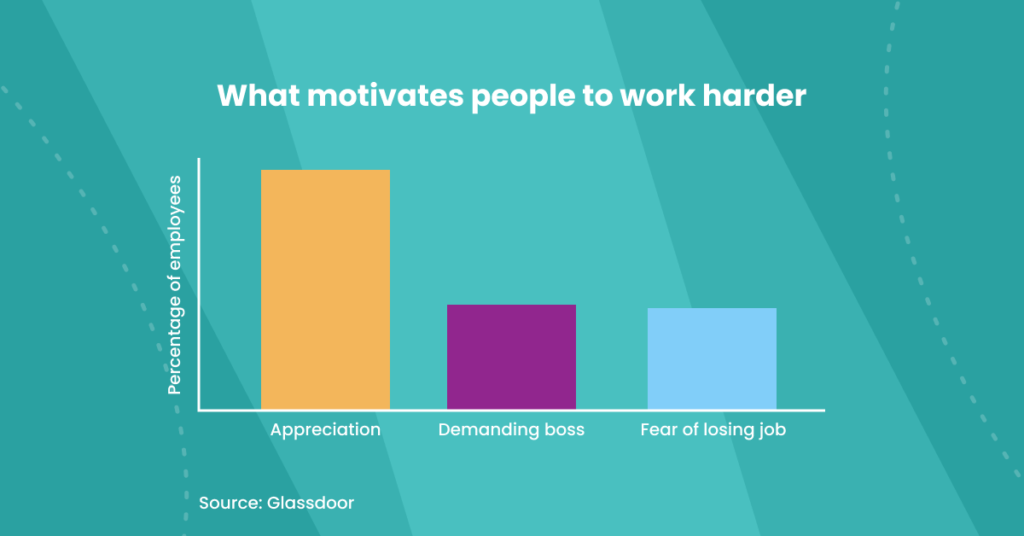
In our on-demand world, we have to remember the importance of customer service motivation. After all, it only takes a minute to give someone the praise they’ve earned.
6. Make career development plans
Most customer service agents are millennials. According to Zippia demographics, call center reps average between the ages of 25 and 40. With a quarter of agents at the beginning of their careers, they may only see this as an entry-level position to beef up their resumes. And a lion’s share of the customer service workforce considers their job as a temporary solution for income. They do not exactly plan on devoting decades of their professional career to customer service.
And this is where that high employee turnover starts in customer service. According to this global retention survey, nearly 50% of agents would consider a clear path to building a career in customer service as having a high impact on their decision to keep their job. But as of now agents are not motivated enough to stay around for longer and climb the career ladder — they can’t see a future in customer service.
In our Agent Empowerment Report we found that only 40% of agents plan on developing a career in customer support, while 60% don’t know or are using it as a stepping stone.
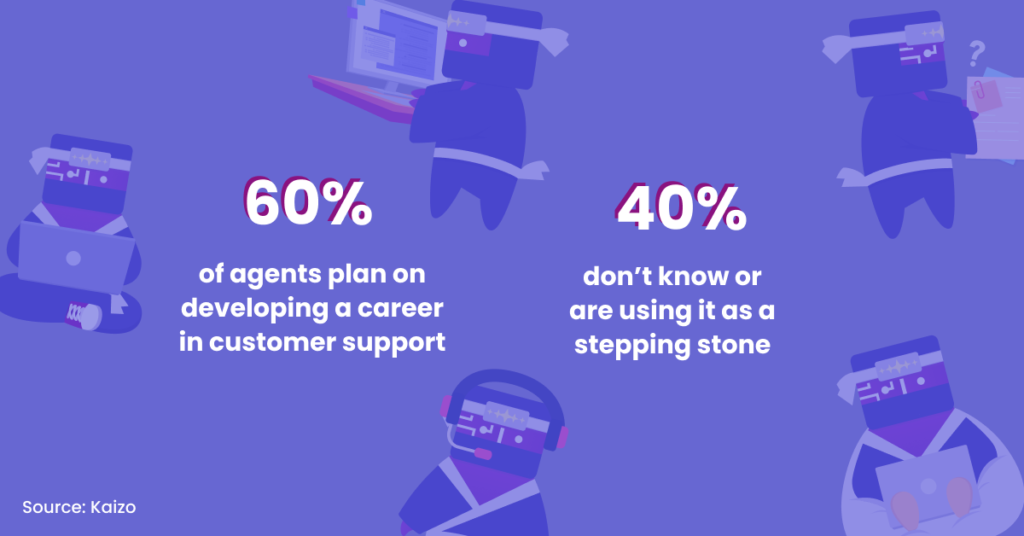
So, how do you motivate employees to provide better customer service?
In a recent webinar about career paths in customer service, Diego Diéz, Global Head of Customer Excellence at MOVO shared with Kaizo that he was once a demotivated agent himself. He and the rest of the panel all agree that the key to driving sustainable motivation in support roles is proving to agents that their job has more to it than answering phones.
Encourage them to consider it as a long-term career, build growth plans, credit where credit is due, and promote people when they deserve it. You customer service agents need to know that their proactiveness will pay off and their experience and expertise will be noticed.
7. Build a strong culture
For a long time, customer service training programs focused on the negative: what not to do. This approach is still common today. According to Gallup, only 14% of employees feel inspired to improve after a performance review. When performance reviews are only focused on what an agent is doing wrong, what motivation do they have left to improve?
This industry attracts problem solvers with a knack for people. They troubleshoot for a living and love it. On top of that, a willingness to learn and a good attitude go a long way in this field. Researchers from the Univeristy of Tennesee tested their theory and proved that when agents are recruited because of this mindset, they also have higher levels of job satisfaction!
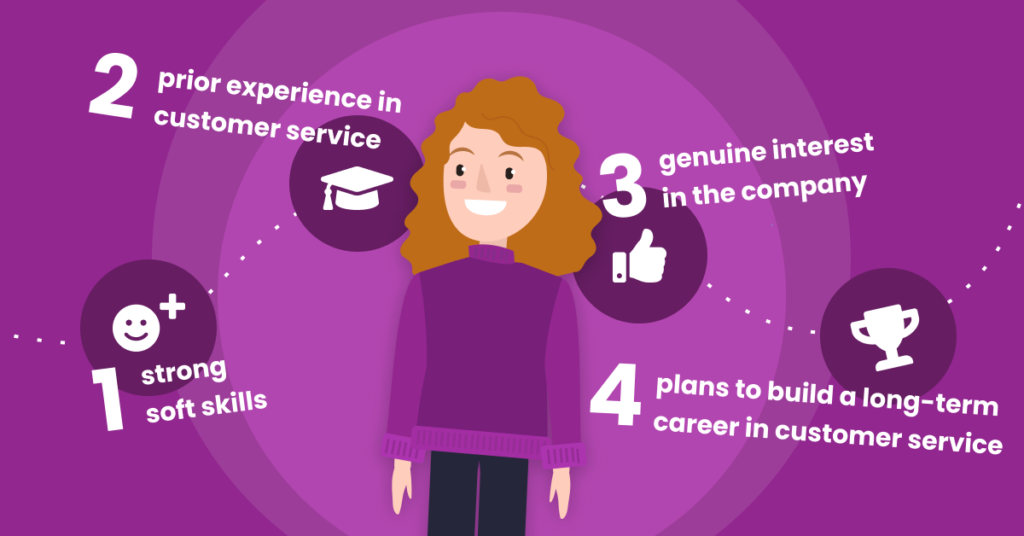
Taking advantage of these traits will benefit all of your agents! As it turns out, the most effective way to motivate someone is to build a culture of coaching, appreciation, and motivation within your team. And use that to help them improve as they go. This is what we call coachable moments.
Rome wasn’t built in a day was it? That’s why being consistent with acting on coachable moments is key for ensuring service motivation.
Final word
The customer service industry is rife with challenges, from the mundane to the unforeseeable. Bad news travels fast, so any slip-up in customer care can lead to a vicious cycle that starts small but can quickly snowball.
Motivating your customer agents is the way out of trouble and towards success. It’s also a way towards building a healthy environment that rewards effort.
The best customer service comes from employees who are genuinely motivated to do their jobs well. Motivation is the key ingredient to not just great customer service, but also to a happy workplace and successful employees.
It’s all about the culture you build. Start small — end big.


